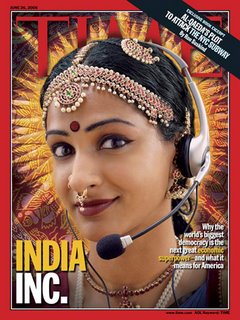India Awakens -This Elephant can dance.
Article in the Time Magazine
Fueled by high-octane growth, the world's largest democracy is becoming a global power. Why the world will never be the same

Even if you have never gone to India--never wrapped your food in a piping-hot naan or had your eyeballs singed by a Bollywood spectacular--there is a good chance you encounter some piece of it every day of your life. It might be the place you call (although you don't know it) if your luggage is lost on a connecting flight, or the guys to whom your company has outsourced its data processing. Every night, young radiologists in Bangalore read CT scans e-mailed to them by emergency-room doctors in the U.S. Few modern Americans are surprised to find that their dentist or lawyer is of Indian origin, or are shocked to hear how vital Indians have been to California's high-tech industry. In ways big and small, Indians are changing the world.
That's possible because India--the second most populous nation in the world, and projected to be by 2015 the most populous--is itself being transformed.
Writers like to attach catchy tags to nations, which is why you have read plenty about the rise of Asian tigers and the Chinese dragon. Now here comes the elephant. India's economy is growing more than 8% a year, and the country is modernizing so fast that old friends are bewildered by the changes that occurred between visits. The economic boom is taking place at a time when the U.S. and India are forging new ties. During the cold war, relations between New Delhi and Washington were frosty at best, as India cozied up to the Soviet Union and successive U.S. Administrations armed and supported India's regional rival, Pakistan. But in a breathtaking shift, the Bush Administration in 2004 declared India a strategic partner and proposed a bilateral deal (presently stalled in Congress) to share nuclear know-how. After decades when it hardly registered in the political or public consciousness, India is on the U.S. mental map.
Among policymakers in Washington, the new approach can be explained simply: India is the un-China. One Asian giant is run by a Communist Party that increasingly appeals to nationalism as a way of legitimating its power. The other is the largest democracy the world has ever seen. The U.S. will always have to deal with China, but it has learned that doing so is never easy: China bristles too much with old resentments at the hands of the West. India is no pushover either (try suggesting in New Delhi that outsiders might usefully broker a deal with Pakistan about Kashmir, the disputed territory over which the two countries have fought three wars), but democrats are easier to talk to than communist apparatchiks. Making friends with India is a good way for the U.S. to hedge its Asia bet.
Democracy aside, there is a second way in which India is the un-China--and it's not to India's credit. In most measures of modernization, China is way ahead. Last year per capita income in India was $3,300; in China it was $6,800. Prosperity and progress haven't touched many of the nearly 650,000 villages where more than two-thirds of India's population lives. Backbreaking, empty-stomach poverty, which China has been tackling successfully for decades, is still all too common in India. Education for women--the key driver of China's rise to become the workshop of the world--lags terribly in India. The nation has more people with HIV/AIDS than any other in the world, but until recently the Indian government was in a disgraceful state of denial about the epidemic. Transportation networks and electrical grids, which are crucial to industrial development and job creation, are so dilapidated that it will take many years to modernize them.
Yet the litany of India's comparative shortcomings omits a fundamental truth: China started first. China's key economic reforms took shape in the late 1970s, India's not until the early 1990s. But India is younger and freer than China. Many of its companies are already innovative world beaters. India is playing catch-up, for sure, but it has the skills, the people and the sort of hustle and dynamism that Americans respect, to do so. It deserves the new notice it has got in the U.S. We're all about to discover: this elephant can dance.




2 Comments:
Nice. Liked the URL
http://www.time.com/time/magazine/article/0,9171,1205385,00.html
..."my roots are so strong that I can fly."...
its good to have new friend(U.S) for strategic relationship..but dont forget old friends(russia)..bcoz all friends are always good friends...
cheers..
http://virtuously.blogspot.com/
Post a Comment
<< Home